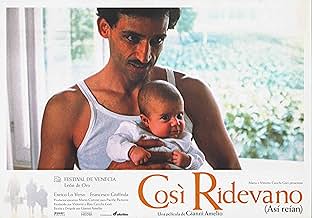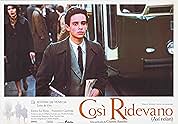Turin at the end of the fifties: two brothers have emigrated there from Sicily and the older works very hard to let the younger study and free himself from poverty through culture. The boy h... Read allTurin at the end of the fifties: two brothers have emigrated there from Sicily and the older works very hard to let the younger study and free himself from poverty through culture. The boy however is not keen on school and would like to begin to work. When after some time he gets... Read allTurin at the end of the fifties: two brothers have emigrated there from Sicily and the older works very hard to let the younger study and free himself from poverty through culture. The boy however is not keen on school and would like to begin to work. When after some time he gets his degree however things take a violent and dramatic turn......
- Director
- Writers
- Stars
- Awards
- 9 wins & 14 nominations total
- Director
- Writers
- All cast & crew
- Production, box office & more at IMDbPro
Featured reviews
The title, referring to an old joke column, is ironic. The film's review of Italian post-war economic miracle years is deeply tinged with sadness and a sense of the price paid in innocence lost to gain security and status. The whole focus is on the love between two Sicilian brothers, Giovanni and Pietro. The angel-faced Pietro (Francesco Giuffrida) from the first appears devious. When his brother arrives at the station, he slinks off and hides from him. He's lazy, a dandy, a liar, a faker, a bad seed. Yet he's worshiped by the innocent, muscular, illiterate Giovanni (Enrico Lo Verso), who has turned up with other southern immigrants at the Turin railway station intending just to visit his baby brother as the film opens and then stays on in the North to support him.
The mise-en-scène is visually beautiful but conventionalizes the period into a kind of grimy poetry more worthy of twenty or thirty years earlier, no doubt consciously echoing Italian neorealist films (Amelio has been called the new De Sica) or becoming a glossier color version of Visconti's mournful epic tragedy of southern Italians in Milan, "Rocco and His Brothers" (1960). My DVD's Italian jacket copy translates a paragraph from Stephen Holden's 2001 NYTimes review expanding one of its key ideas: "'Così rideveno'has the power to keep its own secrets," this Italian version reads. "Without ever being moralistic, by the end it becomes the metaphor for a whole society that makes a kind of tacit pact with itself never to look too deeply into the hidden effects social processes have on individuals and their destinies." The interest -- and yet the frustration -- of the film is that its sequences each appear revelatory, but shed little light on the intervening periods of time. It is organized in a "rather elegant" manner (Rosenbaum) into a structure of microscopic views of single days out of each year from 1959 through 1964, each day designated by a key word: "arrivals," "deceptions," "money", "letters, "blood," and "families." This neat structure masks a surrounding mystery in the relationship between the two brothers, and we deduce for ourselves from the way they seek out and avoid each other how alike and interdependent they are. Each cherishes illusions about the other; one is proud, the other ashamed. Vivid and touching as the film is, it's also highly artificial, notably in how little of the two characters' lives is made clear, how little the world outside their relationship is explored.
Metaphorical indeed, "Così ridevano" explores an inseparable (and ultimately false) dichotomy between innocence and experience, naiveté and sophistication that may go to the heart not only of North-South relations but of the Italian soul. Both actors, Amelio regular Lo Verso and newcomer Giuffreda, are remarkable, and the scenes between them are heartbreaking.
So far the only other Amelio film I've seen is "The Housekeys" ("Le chiavi di casa," 2004), which being a documentary-like chronicle of a short stretch of contemporary time, seems so different, and yet on reflection is so similar in feeling. Obviously Amelio is an extraordinary director and I must see "Lamarica" and "Stolen Children" ("Il ladro di bambini"), both also starring the intense, soulful Lo Verso, which have received the highest praise of any of Amelio's films.
It shows one day in their life each year between 1958 and 1964, avoiding movie convention by not filling in the details of what's gone on during the time in between. It's left to us to figure out, or imagine.
While brave and challenging, the characters never fully develop, sometimes feeling more sketchy and symbolic than full blooded.
Early on I thought I might be watching a masterpiece, but as it went on, I felt (to quote Chicago Reader critic Jonathan Rosenberg) 'guilty for not liking it more'. Still, a strong and original enough film that I'd like to revisit it one day, and see if it grows even deeper on 2nd viewing.
Giovanni's love and personal honor require that he believe no ill about Pietro. The older brother works like an ox to shield his Pietro-on-a-pedestal from the harsh world of manual labor, to give him better lodgings than he himself enjoys and to keep him in school (where Pietro actually is an inveterate hookey-player and a bored, listless daydreamer).
Though Pietro is detached he nevertheless feels guilt for his deceptions and he loves Giovanni for his sacrifice and natural goodness. ("Giovanni is far too good," he says to the whore-waif his older brother has taken under his protection. "He loves everybody").
But while the facile and literate Pietro drifts, the illiterate but intelligent Giovanni makes useful friends, exploits opportunities and rises in life.
Always Pietro remains at the center of Giovanni's heart. And one night Pietro is given the opportunity, finally, to repay Giovanni's selfless devotion.
If there is a "revelation" in this film, it is near the end when we see that the adoring Giovanni has an unexamined, unquestioned faith that his Pietro has the same devotion to him. As a given, he believes that brotherly sacrifice is a two-way street. The immense decision that his younger brother has made against himself and for Giovanni is merely the kind of thing brothers do for eachother. In a horrifying moment Giovanni opens to us: his great love is unselfconsciously, blanketingly possessive, devouring.
Palermo-born Lo Verso is a great actor. That his beautiful, movingly expressive face is not world-famous is a misfortune. But he is only forty now (early thirties in "Cosi Ridivano"). There is time. Jim Smith-----------------------
Did you know
- TriviaThe title refers to the back page of a popular 1950s Italian magazine which had a section devoted to old jokes that were no longer funny but still evoked a sense of nostalgia. One such joke is repeated throughout the film: "How do you get four elephants in a Fiat?" The answer: "Two in front and two in back".
- ConnectionsReferenced in Cannes Paradise (1999)
- SoundtracksCucara cha cha cha
Written by Tony Vargas and Pepe Villa
Performed by Dámaso Pérez Prado
Courtesy of Peer International Corp./Edizioni Peersongs Italy Srl
Details
Box office
- Gross US & Canada
- $57,009
- Gross worldwide
- $57,009






















